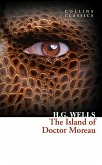H. G. Wells' "The Island of Doctor Moreau" intricately weaves themes of colonialism, ethics, and the nature of humanity through a gripping narrative that blends science fiction with gothic elements. Set in the late 19th century, the novel explores the harrowing tale of Edward Prendick, who becomes marooned on a mysterious island controlled by the tyrannical scientist Dr. Moreau. Using vivisection, Moreau transforms animals into human-like creatures, prompting readers to ponder the implications of playing god and the moral boundaries of scientific experimentation. Wells' masterful use of vivid imagery and rich symbolism heightens the philosophical discourse, making this work a cornerstone of early science fiction literature. H. G. Wells, often hailed as the father of science fiction, drew from his experiences as a social commentator and an advocate for scientific progress. His keen interest in evolution, spurred by the works of Darwin and contemporaneous debates on ethics in science, undoubtedly informed his visceral portrayal of Moreau's experiments. Through his complex characters and unsettling scenarios, Wells criticizes humanity's propensity for hubris and the potential consequences of unbridled technological advancement. This compelling narrative is not merely an adventure story; it is a profound reflection on the essence of humanity and morality in the face of scientific progress. "The Island of Doctor Moreau" is highly recommended for readers interested in the ethical complexities within scientific inquiry and the darker sides of human nature, making it a timeless piece that continues to resonate in contemporary dialogues.
Dieser Download kann aus rechtlichen Gründen nur mit Rechnungsadresse in A, B, BG, CY, CZ, D, DK, EW, FIN, F, GR, H, IRL, I, LT, L, LR, M, NL, PL, P, R, S, SLO, SK ausgeliefert werden.









